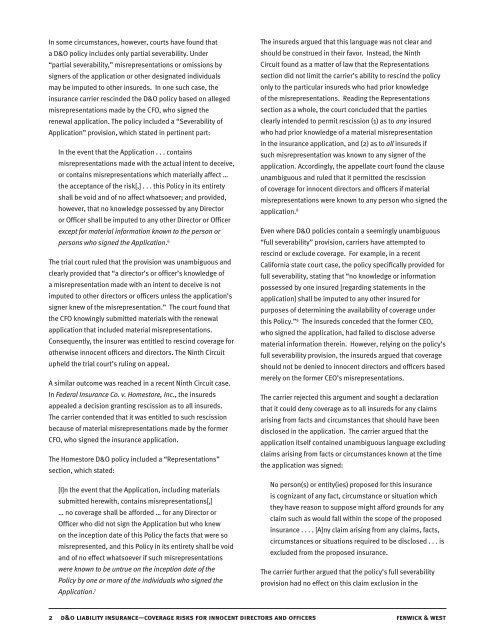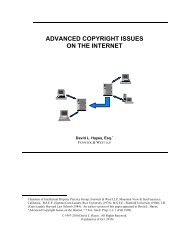D&O Liability Insurance-Coverage Risks for Innocent Directors and ...
D&O Liability Insurance-Coverage Risks for Innocent Directors and ...
D&O Liability Insurance-Coverage Risks for Innocent Directors and ...
Create successful ePaper yourself
Turn your PDF publications into a flip-book with our unique Google optimized e-Paper software.
In some circumstances, however, courts have found thata D&O policy includes only partial severability. Under“partial severability,” misrepresentations or omissions bysigners of the application or other designated individualsmay be imputed to other insureds. In one such case, theinsurance carrier rescinded the D&O policy based on allegedmisrepresentations made by the CFO, who signed therenewal application. The policy included a “Severability ofApplication” provision, which stated in pertinent part:In the event that the Application . . . containsmisrepresentations made with the actual intent to deceive,or contains misrepresentations which materially affect …the acceptance of the risk[,] . . . this Policy in its entiretyshall be void <strong>and</strong> of no affect whatsoever; <strong>and</strong> provided,however, that no knowledge possessed by any Directoror Officer shall be imputed to any other Director or Officerexcept <strong>for</strong> material in<strong>for</strong>mation known to the person orpersons who signed the Application. 6The trial court ruled that the provision was unambiguous <strong>and</strong>clearly provided that “a director’s or officer’s knowledge ofa misrepresentation made with an intent to deceive is notimputed to other directors or officers unless the application’ssigner knew of the misrepresentation.” The court found thatthe CFO knowingly submitted materials with the renewalapplication that included material misrepresentations.Consequently, the insurer was entitled to rescind coverage <strong>for</strong>otherwise innocent officers <strong>and</strong> directors. The Ninth Circuitupheld the trial court’s ruling on appeal.A similar outcome was reached in a recent Ninth Circuit case.In Federal <strong>Insurance</strong> Co. v. Homestore, Inc., the insuredsappealed a decision granting rescission as to all insureds.The carrier contended that it was entitled to such rescissionbecause of material misrepresentations made by the <strong>for</strong>merCFO, who signed the insurance application.The Homestore D&O policy included a “Representations”section, which stated:[I]n the event that the Application, including materialssubmitted herewith, contains misrepresentations[,]… no coverage shall be af<strong>for</strong>ded … <strong>for</strong> any Director orOfficer who did not sign the Application but who knewon the inception date of this Policy the facts that were somisrepresented, <strong>and</strong> this Policy in its entirety shall be void<strong>and</strong> of no effect whatsoever if such misrepresentationswere known to be untrue on the inception date of thePolicy by one or more of the individuals who signed theApplication. 7The insureds argued that this language was not clear <strong>and</strong>should be construed in their favor. Instead, the NinthCircuit found as a matter of law that the Representationssection did not limit the carrier’s ability to rescind the policyonly to the particular insureds who had prior knowledgeof the misrepresentations. Reading the Representationssection as a whole, the court concluded that the partiesclearly intended to permit rescission (1) as to any insuredwho had prior knowledge of a material misrepresentationin the insurance application, <strong>and</strong> (2) as to all insureds ifsuch misrepresentation was known to any signer of theapplication. Accordingly, the appellate court found the clauseunambiguous <strong>and</strong> ruled that it permitted the rescissionof coverage <strong>for</strong> innocent directors <strong>and</strong> officers if materialmisrepresentations were known to any person who signed theapplication. 8Even where D&O policies contain a seemingly unambiguous“full severability” provision, carriers have attempted torescind or exclude coverage. For example, in a recentCali<strong>for</strong>nia state court case, the policy specifically provided <strong>for</strong>full severability, stating that “no knowledge or in<strong>for</strong>mationpossessed by one insured [regarding statements in theapplication] shall be imputed to any other insured <strong>for</strong>purposes of determining the availability of coverage underthis Policy.” 9 The insureds conceded that the <strong>for</strong>mer CEO,who signed the application, had failed to disclose adversematerial in<strong>for</strong>mation therein. However, relying on the policy’sfull severability provision, the insureds argued that coverageshould not be denied to innocent directors <strong>and</strong> officers basedmerely on the <strong>for</strong>mer CEO’s misrepresentations.The carrier rejected this argument <strong>and</strong> sought a declarationthat it could deny coverage as to all insureds <strong>for</strong> any claimsarising from facts <strong>and</strong> circumstances that should have beendisclosed in the application. The carrier argued that theapplication itself contained unambiguous language excludingclaims arising from facts or circumstances known at the timethe application was signed:No person(s) or entity(ies) proposed <strong>for</strong> this insuranceis cognizant of any fact, circumstance or situation whichthey have reason to suppose might af<strong>for</strong>d grounds <strong>for</strong> anyclaim such as would fall within the scope of the proposedinsurance . . . . [A]ny claim arising from any claims, facts,circumstances or situations required to be disclosed . . . isexcluded from the proposed insurance.The carrier further argued that the policy’s full severabilityprovision had no effect on this claim exclusion in the d&o liability insurance—coverage risks <strong>for</strong> innocent directors <strong>and</strong> officers fenwick & west
















